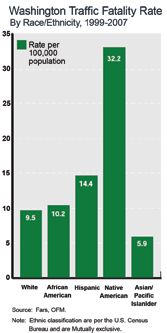Washington Traffic Safety Commission (WTSC) and Washington Department of Transportation (WSDOT) have led the development, implementation, and update of Washington’s SHSP (Target Zero) in collaboration with Washington State Patrol (WSP), the Department of Licensing, and others state and local agencies. More recently, these SHSP leaders have made efforts to garner additional participation from more local agencies, private industry, nonprofit groups, and Native American Tribes.
There are 29 Federally Recognized Tribes located within the borders of Washington State. The fatality rate for Native Americans in the State is 3.3 times higher than for non-Native Americans and data from 1999 through 2008 shows Native American fatalities are high across all types of motor vehicle crashes. Native American reservations in Washington often include a mix of Tribal, state, county, and city roads, which creates jurisdictional complexities with law enforcement, collision reporting, road maintenance, and capital safety projects.
Several steps led to increased attention on these Tribal safety issues in the most recent update of Target Zero. Through the annual Centennial Accord (CA), the State of Washington and Tribes have formally committed to working together on a government-to-government basis. Issues addressed by the CA include transportation. During the October 2008 Tribal/State Transportation Conference, Tribal planners and representatives of WSDOT and WTSC discussed traffic safety concerns and partnership opportunities. This led to a larger role for tribes in the update of Target Zero than they had in previous editions.
In May 2009, the state held the Tribal Traffic Safety Summit (sponsored by the FHWA Office of Federal Lands Highway), where WSDOT, WTSC, FHWA, Washington State Patrol (WSP), Northwest Tribal Technical Assistance Program (TTAP), Tribal Transportation Planning Organization (TTPO), Bureau of Indian Affairs (BIA), and National Highway Traffic Safety Administration (NHTSA) joined many tribes to discuss reducing traffic fatalities and serious injuries on reservation roads and among Native Americans in the state. During this summit, tribal, state, Federal staff, and partners focused on the 4 Es of traffic safety (engineering, enforcement, education, and emergency response) and made recommendations on how to elevate Native American priorities within the Target Zero process, as well as recommendations for immediate next steps at the tribal level for stakeholders to take charge of safety issues.

Leadership involved in the summit carried forward the results from that discussion for consideration during the annual CA on June 23, 2009. Four CA action items resulted, including focusing efforts of WTSC and TTAP to increase tribal involvement in the update and implementation of Target Zero. In addition to carrying forward recommendations from the summit, the new Target Zero update includes strategies from the national Strategic Highway Safety Plan for Indian Lands.
WSDOT circulated draft Target Zero strategies to tribal transportation planners in January 2010 for comment. WSDOT and WTSC then released a preliminary version of the plan in April 2010 for formal tribal consultation, before presenting it to the Governor’s office in May 2010.
Key Accomplishments
- Held a Tribal Traffic Safety Summit.
- Reinforced relationship between State of Washington and Tribes provides context for addressing critical safety data challenges.
- SHSP Target Zero explicitly addresses tribal traffic safety issues.
Results
Actively engaging tribes in discussions and planning has resulted in explicit consideration of Native American traffic safety issues in the update of Washington State’s Target Zero SHSP. The new plan includes an entire section focused specifically on Native American Tribes. In addition, some recommended strategies from the Tribal Traffic Safety Summit are included under the respective emphasis area sections. WSDOT has also offered to collaborate with tribes on the reauthorization of the Federal surface transportation act.
Contact
Lowell Porter
Director
Washington Traffic Safety Commission
360-725-9899
LPorter@wtsc.wa.gov
